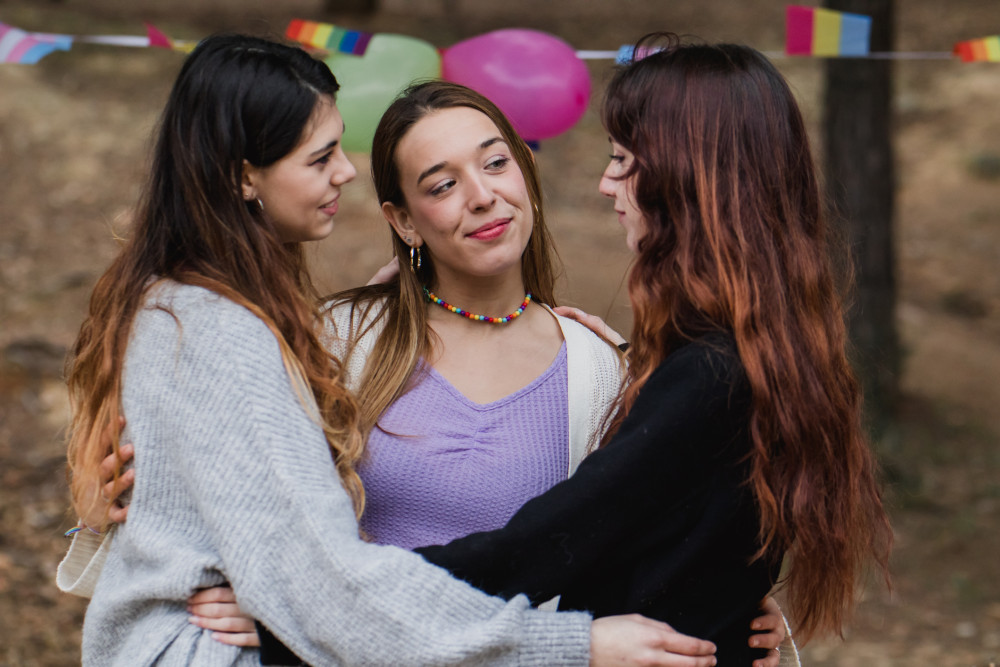Monogamy is still the most common type of relationship in our society today - but it’s not the only one! In this article we will tell you about the basic types of sexual and emotional relationships that exist, so that you can choose the one that best suits the way you feel.
What is a relationship orientation?
Surely you have heard of "sexual orientation", "gender identity"... but it is likely that "relationship orientation" sounds Greek to you. It's a concept that is on the rise and serves to define the way we choose to relate to each other sexually and affectively. It's a term I love and it implies that..
- it is not taken as a fact that the only way to bond is from monogamy, but that there is a vast relational range within which we can choose the option with which we feel more comfortable: polyamory, monogamy, open relationship, polyfidelity ... There is a whole spectrum of equally valid options from which you can choose.
- the relationship orientation is chosen and fluctuating. We live liquid lives where "forever" has disappeared. Where our identities and orientations fluctuate throughout our lives. And where our way of loving can adapt to our circumstances. Is it possible to move from an open, sexually affective relationship to an exclusive relationship? Of course, and it is neither a failure nor an involution. You can change your relationship orientation as many times as you want and need, you and the people with whom you are linked. You can try, make mistakes, try again, experiment... Feel free to bond as you wish!
What types of relationship orientations are there?
Mainly, we distinguish between 2 spectrums:
1. Monogamy


Monogamy implies sexual and affective exclusivity. That is to say, you can only sleep with and be in love with one person at a time. Infidelity, therefore, is the breaking of this pact. This pact, however, is often implicit, meaning it is assumed without talking about it. Because of that, sometimes it is also not clearly communicated where each member of the couple considers infidelity to begin.
For example: for one, infidelity might start at their partner sleeping with someone else, for the other, flirting or merely liking a post on Instagram may already be perceived as infidelity.
Monogamy can be understood as a way of bonding (affective and sexual exclusivity), but also as a cultural system that responds to the ideals of romantic love based on possession, jealousy, reproduction, nuclear family, marriage..
According to monogamous ideals, the partner is the center of everything, our "other half" (because we are incomplete, supposedly), it’s the person with whom we cohabit, grow and to whom we owe much greater care and affective responsibility than we owe to our friends or family. You have been told that your partner is above all things and that, in the name of love, anything is okay (even abuse). The classic heteronormative monogamy between a man and woman is also a place where gender roles are materialized, and where certain attributes and qualities are imposed on them. Women are sweet, fragile, dependent, complacent, irrational... and men are independent, brave, confident, ambitious. Gender responds to the needs of monogamy and, in turn, to the needs of capital.
However, it is one thing to criticize the system and another to criticize the interpersonal relationships between individuals. The reality is that you may have chosen affective sexual exclusivity without agreeing with these ideals of toxic romanticism.
Monogamy is, in my opinion, a relationship orientation just as valid as any other. Not understood as a system but as a personal decision. And, in fact, since relationships are fluctuating, many people start in monogamy, open their relationships on a sexual or affective level, change them back to exclusivity when they need it... There is no evolution or "better" direction in how we relate!
2. Non-monogamy


Non-monogamy implies that there is no exclusivity in an aspect, either sexually or affectively. There are many types of non-monogamous orientations:
Non-exclusive sexual relationships
These are relationships in which we have a single affective partner with whom we can cohabit, breed, have common projects or all of the above, and we explicitly agree to have sexual encounters with third parties. Generally in this type of relationship it would be considered an infidelity to fall in love with someone else. This is because sex and love are considered divisible entities and affections are relegated only to the couple, while eroticism is shared with others.
There are two main types of non-exclusive sexual relationships:
- Swingers: Swinging couples agree on sexual encounters with other people, while both members of the couple are present. The principal value here is that of "sharing" the pleasure and increasing erotic "compression": pleasure is obtained by watching the partner with other people. Therefore, swingers' sexual experiences always involve group sex: exchanging partners, threesomes, orgies, gangbangs... The fidelity pact here is usually that sleeping with a third party without sharing that experience with the partner or doing so without their consent implies a rupture of the agreement.
- Liberal or open: Liberal couples or simply "open relationships" have an agreement that they can sleep with third parties without both partners being present. They can date, have erotic experiences separately, go to sex clubs with others... They experience their sexuality beyond the couple and in a consensual way. However, some open couples choose to tell each other those experiences after living them (and sometimes that is part of the erotic experience, sharing the details of the sexual experience with your partner) and others prefer not to share those details, they give each other freedom, but "out of sight..."
Non-exclusive sexual and affective relationships
This way of bonding implies that there is no exclusivity neither in affection nor in sexuality. That is to say, it is allowed to have relations with more than one person at the same time, simultaneously, consensually and with all the burden of affective responsibility, care and time that having a relationship implies. Affections are multiplied, not divided. In this type of expansive relationship, we generally do not speak of couples but of bonds.
What types of open sexual and affective relationships are there?
Polyamory, hierarchical and non-hierarchical:
People who are linked in polyamory consider that love is not a source that is exhausted and just as a mother or father can love all their children equally, we can experience the same towards the people with whom we are affectively and sexually linked. It should be said that polyamorous bonds do not necessarily have to be directly related to sexuality, since it is also possible to be polyamorous and asexual (I can be affectively linked with more than one person, but not feel erotic desire and, therefore, my bonds are only romantic but plural).
There are people who have hierarchical polyamorous bonds in which there is a partner or polyfidelity group (for example, a trio) that is the primary one (also called "anchor") and that is placed in the center, while the rest of the bonds are subjugated to be secondaries. A hierarchy of privileges is established on the basis of which the expectations of the relationship, the agreements or the vetoes are accommodated.
On the other hand, non-hierarchical polyamorous people consider that hierarchy implies authority, someone above other people according to their level of importance and that this is unethical. Secondary links have little capacity for control and agency and their needs always depend on the primary relationship. Therefore, in these types of bonds, there are no prioritizations.
Relationship anarchy:
This political philosophy is transferred to relationships to make a redefining proposal for bonds in general. The basic idea is that labels, the name we give to each person with whom we are linked (friend, partner, mother...) gives rise to a series of expectations and norms of what the relationship will or even should be like.
For example, if I tell you "you are my girlfriend" you know that this might mean that we will have sex, maybe that we will cohabit, probably that I will invite you to Christmas dinner with my family and that if we are together for long enough, maybe one day we will get married and have children. This "taking for granted", this normativity of the bonds, is what relationship anarchy intends to banish by self-defining how the relationship should be with each bond and what degree of involvement, care and time will be allocated to that specific relationship.
Why so many labels?
I am a strong advocate of labels and the beautiful postmodern words that serve to identify ourselves. It is true, though, that the indiscriminate use of labels can have negative effects: over-labeling, for example, is exclusionary (many concepts are difficult to understand and create closed circles of knowledge) and can constrain us, preventing us from evolving.
In a famous scene from the Spanish movie "Poliamor para principiantes" (Polyamory for dummys) there is an obvious ridiculing of the use of labels in feminist and non-monogamous circles. Although the scene is funny and it is great that we are self-critical with this trivialization of concepts, in my opinion, it is still super necessary that we use words that allow us to ascribe ourselves to a reality, to know who we are, to look for affinities, support groups etc.
However, if your relational, sexual orientation or gender identity is not what society "expects" (e.g., you are polyamorous, bisexual or trans) you will likely need to use more labels to be understood.
Therefore, I encourage you, before criticizing others' labels, to review your own and ask yourself why you are so uncomfortable with these unfamiliar terms.
What is your relationship orientation? What label fits your way of loving and desiring? Share in the forum!
JOYclub: What is that?
- With over 5 million members, JOYclub is a lively, sex-positive community that will turn your love life completely upside down.
- Whether you're male, female, trans, single or a couple, JOYclub is the place to discover and live out your erotic fantasies with other members (with your partner, if you like).
- Curious? Then register for free and without obligation and discover the fascinating JOYclub world. We are looking forward to meeting you!







